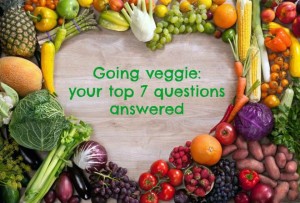
Summer is just around the corner – that amazing time of year when fresh produce thrives. Many of us will be tempted to stray from our usual diet to try something a little different, whether it’s to help shift those pounds or make the most of the gorgeous fruit and veg in season.
If you’re tempted to cut back on meat, you may have a lot of questions about maintaining a balanced diet. Here are the most common questions I get: is it healthier than a non-vegetarian diet? Do I need to take supplements? And every gymaholics favorite question – will a vegetarian diet affect my athletic performance? Read on for some answers!
1. But first, what is a ‘vegetarian’?
Vegetarian is a broad term given to a diet that excludes all meat, fish and poultry. The 3 main categories of vegetarian are:
- Lacto-ovo vegetarians: consume dairy products and egg but no animal flesh foods
- Lacto vegetarians: consume dairy but no eggs or animal flesh foods
- Vegans: do not consume any dairy products, eggs or animal flesh foods
2. What are the health benefits?
Studies suggest that a plant-based diet can provide a number of health benefits including reduced risk of obesity, heart disease and type II diabetes. As long as the diet is varied and balanced, vegetarians can consume less saturated fat and more folate, fibre and antioxidants, plus as a vegetarian you’re more likely to exceed the recommended daily intake of fruit and vegetables.
3. How do I get enough iron?
Iron functions primarily as a carrier of oxygen in the blood. It is readily available in a variety of foods including pulses such as lentils and kidney beans, dark-green vegetables including spinach and broccoli, wholegrains and fortified cereals. Including a source of vitamin C with these foods increases iron absorption.
4. How do I get enough calcium?
Calcium is necessary for strong bones and is often provided by dairy products. For vegans, alternative sources of calcium include leafy green vegetables, broccoli, almonds, and fortified products such as tofu and soy milk. Remember that our bodies also need Vitamin D to absorb calcium from fortified spreads, cereals, eggs and a daily dose of sunshine!
5. What about Vitamin B12?
Vitamin B12 is only found naturally in foods from animal sources, including dairy products and eggs. However, vegans will need to rely on supplements or fortified sources. Sources include fortified cereals, soy products and yeast extract, such as Marmite. Check food labels to ensure they contain fortified vitamin B12.
5. Do vegetarian sources of omega-3 fatty acids have the same health benefits as oily fish?
Omega-3 fatty acids are important for heart health. Rapseed oil, soy oil, walnuts, ground flaxseed and soybeans are good vegetarian sources of essential fatty acids. Although these foods may not have the same benefits for reducing the risk of heart disease as those found in oily fish, vegetarians can improve heart health by eating enough fruit and vegetables, and by reducing intake of saturated fat and salt.
6. Do I need supplements?
Eating a balanced and healthy diet including a wide variety of foods, and eating enough calories to support energy requirements, should ensure sufficient intake of nutrients without the need for supplements. However, poorly planned diets are likely to miss adequate calcium, iron and vitamin B12. Moreover, some groups are at higher risk of certain deficiencies. Women, in particular, may be advised to take supplements by their healthcare provider.
7. Is it possible to build muscle?
Many weight trainers hesitate to make the transition to vegetarianism due to this one question. The simple answer is: yes you can build muscle!
To build muscle you will need sufficient calories from whole foods like fruits, vegetables, whole grains, and beans/nuts, and plenty of protein for the body to grow and repair itself. Good sources of protein include pulses and beans, cereals (wheat, oats, rice), soya products (tofu, soya milk), nuts and seeds, as well as eggs and low fat dairy products (milk, cheese, yoghurt) for non-vegans. Ensure you consume different sources to get the right mixture of amino acids for maximum benefits.
No meat, No problem!
Vegetarianism has gained popularity and is a great option as long as your diet is varied and balanced to meet all your nutrient requirements. Although I am not a vegetarian, I do agree that protein-rich meat has become too prominent in our diets, despite the “Eatwell plate” recommendation that less than 15% of our diet should be protein.
If you do decide to follow a vegetarian diet, apply all the same principles that you would to any healthy and balanced diet: eat plenty of different fruits and vegetables, whole grains, beans, pulses and other proteins to ensure you’re getting all the nutrients, and limit sugary and fatty foods.





Share your thoughts...